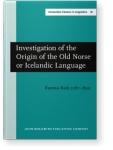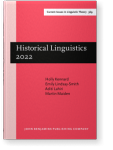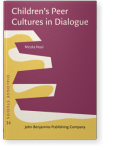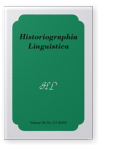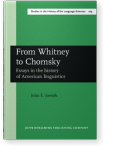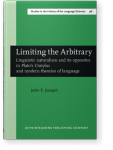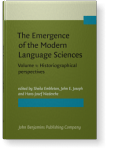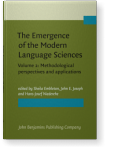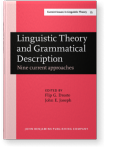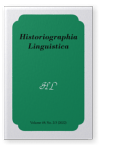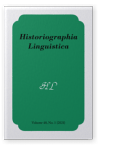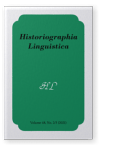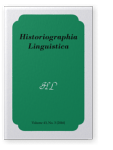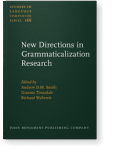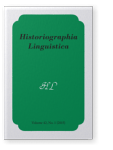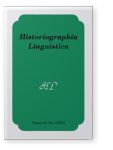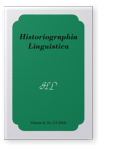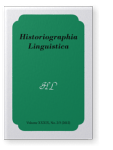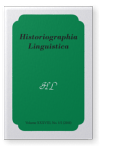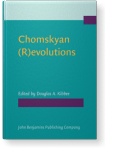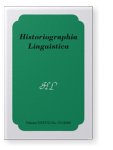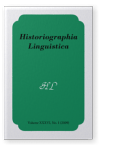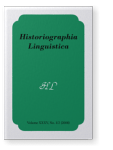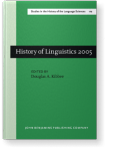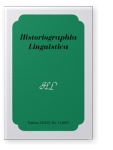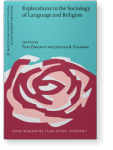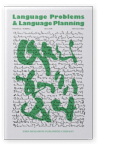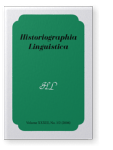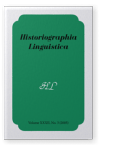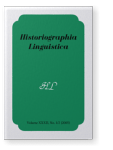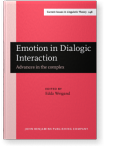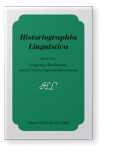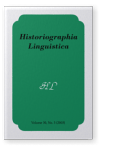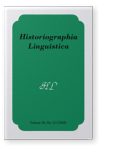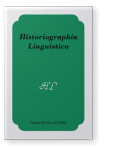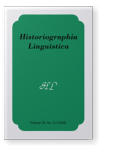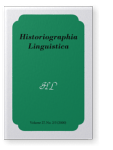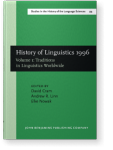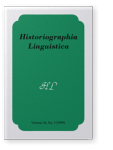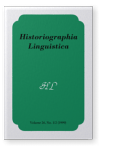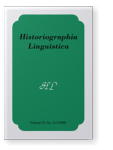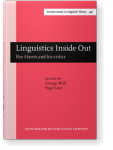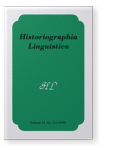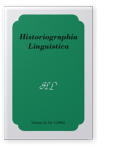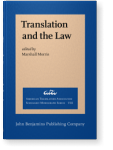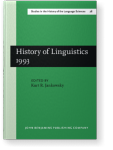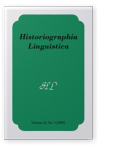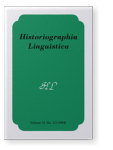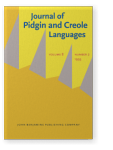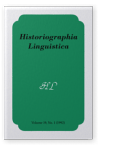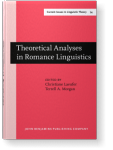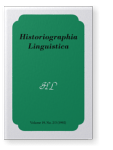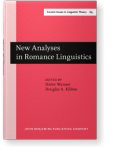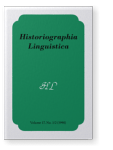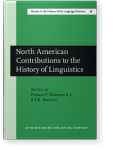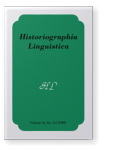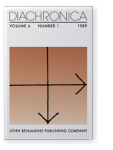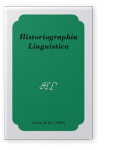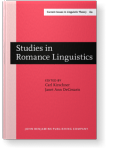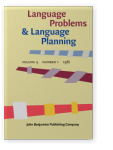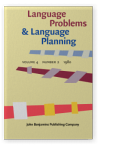John E. Joseph
List of John Benjamins publications for which John E. Joseph plays a role.
Book series
Journal
ISSN 0302-5160 | E-ISSN 1569-9781
From Whitney to Chomsky: Essays in the history of American linguistics
John E. Joseph
[Studies in the History of the Language Sciences, 103] 2002. viii, 240 pp.
Subjects History of linguistics
Limiting the Arbitrary: Linguistic naturalism and its opposites in Plato's Cratylus and modern theories of language
John E. Joseph
[Studies in the History of the Language Sciences, 96] 2000. x, 224 pp.
Subjects History of linguistics | Philosophy | Theoretical linguistics
The Emergence of the Modern Language Sciences: Studies on the transition from historical-comparative to structural linguistics in honour of E.F.K. Koerner. Volume 1: Historiographical perspectives
Edited by Sheila Embleton, John E. Joseph and Hans-Josef Niederehe
[Not in series, EMLS 1] 1999. lvi, 310 pp.
Subjects Historical linguistics | History of linguistics | Theoretical linguistics
The Emergence of the Modern Language Sciences: Studies on the transition from historical-comparative to structural linguistics in honour of E.F.K. Koerner. Volume 2: Methodological perspectives and applications
Edited by Sheila Embleton, John E. Joseph and Hans-Josef Niederehe
[Not in series, EMLS 2] 1999. lvi, 335 pp.
Subjects Historical linguistics | History of linguistics | Theoretical linguistics
Linguistic Theory and Grammatical Description: Nine Current Approaches
Edited by Flip G. Droste and John E. Joseph
[Current Issues in Linguistic Theory, 75] 1991. vii, 355 pp.
Subjects Syntax | Theoretical linguistics
2024 The distributed invention of enunciation theory Historiographia Linguistica: Online-First Articles | Article
In the second half of the 20th century a linguistic approach emerged that aimed to complement the analysis of language structure: énonciation, centred on speakers and the act of speaking. Émile Benveniste has had his role raised to author of the theory, despite its developing simultaneously in… read more
2021 The Koernerian revolution: In memoriam E. F. K. Koerner (1939–2022) Historiographia Linguistica 48:2/3, pp. 145–151 | Obituary
2016 Divided Allegiance: Martinet’s preface to Weinreich’s Languages in Contact (1953) Historiographia Linguistica 43:3, pp. 343–362 | Article
Read outside its immediate historical context, Languages in Contact (1953) by Uriel Weinreich (1926–1967), most particularly its Preface by André Martinet (1908–1999), contains statements that can seem contradictory and mystifying. Describing his student Weinreich’s book, Martinet characterises… read more
2015 Preface: Meillet and grammaticalisation New Directions in Grammaticalization Research, Smith, Andrew D.M., Graeme Trousdale and Richard Waltereit (eds.), pp. vii–xv | Preface
2015 Iconicity in Saussure’s Linguistic Work: And why it does not contradict the arbitrariness of the sign Historiographia Linguistica 42:1, pp. 85–105 | Article
Ferdinand de Saussure (1857–1913) is routinely criticized for denying the possibility of iconicity in language through his principle of the arbitrariness of linguistic signs. Yet two of his articles, one from the beginning (1877) and the other from the end (1912) of his career, propose analyses… read more
2014 Keith Allan (ed.), The Oxford Handbook of the History of Linguistics Historiographia Linguistica 41:1, pp. 176–180 | Review
2014 Anagrammes homériques. Par Ferdinand de Saussure Historiographia Linguistica 41:2/3, pp. 398–401 | Review
2012 Language Pedagogy and Political-Cognitive Autonomy in Mid-19th Century Geneva: The Latin manuals of Louis Longchamp (1802–1874) Historiographia Linguistica 39:2/3, pp. 259–277 | Article
Charles-Louis Longchamp (1802–1874) was the dominant figure in Latin studies in Geneva in the 1850s and 1860s and had a formative influence on the Latin teachers of Ferdinand de Saussure (1857–1913). Longchamp’s work was in the grammaire générale tradition, which, on account of historical… read more
2012 The Genius of the Italian Language: Politics and Poetics Historiographia Linguistica 39:2/3, pp. 369–377 | Review article
2012 ‘All Languages Are Equally Complex’: The rise and fall of a consensus Historiographia Linguistica 39:2/3, pp. 341–368 | Article
Throughout most of the history of the discipline, linguists have had little hesitation in comparing languages in terms of their relative complexity, whether or not they extrapolated judgements of superiority or inferiority from such comparisons. By the mid 20th century, however, a consensus had… read more
2010 Chomsky’s Atavistic Revolution (with a little help from his enemies) Chomskyan (R)evolutions, Kibbee, Douglas A. (ed.), pp. 1–18 | Article
The Oxford English Dictionary defines Modernism as a “movement characterised by a deliberate break with classical and traditional forms or methods”. This is borne out by examination of how ‘modern’ linguists have routinely established an ironic distance between their own work and what went before.… read more
2010 Saussure’s Notes of 1881–1885 on Inner Speech, Linguistic Signs and Language Change Historiographia Linguistica 37:1/2, pp. 105–132 | Article
This article analyses previously unpublished notes by Ferdinand de Saussure (1857–1913) contained in a single large register which he used in the first half of the 1880s. The earliest pages include his detailed reactions to La parole intérieure (1881) by Victor Egger (1848–1909). Although these… read more
2008 Undangerous Fair-Mindedness: The Culmination of Two Men’s Search for Saussure Historiographia Linguistica 35:1/2, pp. 163–176 | Review article
2007 The natural: Its meanings and functions in the history of linguistic thought History of Linguistics 2005: Selected papers from the Tenth International Conference on the History of the Language Sciences (ICHOLS X), 1–5 September 2005, Urbana-Champaign, Illinois, Kibbee, Douglas A. (ed.), pp. 1–23 | Article
Attempts at distinguishing one part of language from another on the basisof naturalness, or certain other criteria that recapitulate the dichotomy of something that is grounded versus something that is not, can be regarded as normative, and ultimately tautological. A historical continuity exists… read more
2007 Two mysteries of Saussure’s early years resolved Historiographia Linguistica 34:1, pp. 155–166 | Miscellaneous
2006 12. The shifting role of languages in Lebanese Christian and Muslim identities Explorations in the Sociology of Language and Religion, Omoniyi, Tope and Joshua A. Fishman † (eds.), pp. 165–179 | Chapter
2006 Linguistic identities: Double-edged swords Language Problems and Language Planning 30:3, pp. 261–267 | Article
Linguistic identities are double-edged swords because, while functioning in a positive and productive way to give people a sense of belonging, they do so by defining an “us” in opposition to a “them” that becomes all too easy to demonise. Studying the construction of identities is important… read more
2006 Publications Received / Ouvrages reçus / Eingegangene Schriften New Approaches to the Study of Later Modern English, pp. 251–262 | Publications received
2005 The centenary of the first publication of Saussure’s sign theory – odier (1905) Historiographia Linguistica 32:3, pp. 309–324 | Article
The 1905 book Essai d’analyse psychologique du méchanisme du langage dans la compréhension by Henri Odier (1873–1938) is noteworthy for containing the first published report of details of the sign theory of Ferdinand de Saussure (1857–1913). This article discusses those details and Odier’s… read more
2005 Publications Received / Ouvrages Reçus / Eingegangene Schriften Historiographia Linguistica 32:1/2, pp. 261–272 | Publications received
2004 Body, passions and race in classical theories of language and emotion Emotion in Dialogic Interaction: Advances in the complex, Weigand, Edda (ed.), pp. 73–96 | Article
2004 Publications Received/Ouvrages Reçus/Eingegangene Schriften Linguistica Berolinensia, Fögen, Thorsten and E.F.K. Koerner † (eds.), pp. 485–499 | Publications received
2003 Pictet’s Du Beau (1856) and the crystallisation of saussurean linguistics Historiographia Linguistica 30:3, pp. 365–388 | Article
The key formative figure in the intellectual life of the young Ferdinand de Saussure was Adolphe Pictet (1799–1875), a family friend best remembered for his Les origines indo-européennes, ou Les Aryas primitifs: Essai de paléontologie linguistique (1859–1863). A review of its second edition… read more
2003 Publications received / Ouvrages reçus / Eingegangene schriften Historiographia Linguistica 30:1/2, pp. 247–258 | Miscellaneous
2002 Is language a verb? — conceptual change in linguistics and language teaching Language in Language Teacher Education, Trappes-Lomax, Hugh and Gibson Ferguson (eds.), pp. 29–47 | Article
2002 Publications received / Ouvrages reçus / Eingegangene schriften Historiographia Linguistica 29:1/2, pp. 279–288 | Miscellaneous
2001 Publications received / Ouvrages reçus / Eingegangene Schriften Historiographia Linguistica 28:1/2, pp. 277–290 | Miscellaneous
2000 The unconscious and the social in Saussure Historiographia Linguistica 27:2/3, pp. 307–334 | Article
Saussure stood between two figures, Whitney and Meillet, each of whom was relentlessly opposed to the dominant psychological establishment of his time. Saussure himself was much more ambivalent about psychology, never portraying it as standing in clear opposition to the interests of linguistics… read more
1999 Introduction: Problems of structuralist beginnings (and endings) The Emergence of the Modern Language Sciences: Studies on the transition from historical-comparative to structural linguistics in honour of E.F.K. Koerner, Embleton, Sheila, John E. Joseph and Hans-Josef Niederehe (eds.), pp. ix–lvi | Miscellaneous
1999 Introduction: Problems of structuralist beginnings (and endings) The Emergence of the Modern Language Sciences: Studies on the transition from historical-comparative to structural linguistics in honour of E.F.K. Koerner, Embleton, Sheila, John E. Joseph and Hans-Josef Niederehe (eds.), pp. ix–lvi | Miscellaneous
1999 The colonial linguistics of Léopold de Saussure History of Linguistics 1996: Volume 1: Traditions in Linguistics Worldwide, Cram, David, Andrew R. Linn and Elke Nowak (eds.), pp. 127–138 | Chapter
1999 Remembering James D. McCawley Historiographia Linguistica 26:3, pp. 265–272 | Obituary
1999 A matter of consequenz: Humboldt, race and the genius of the Chinese Language Historiographia Linguistica 26:1/2, pp. 89–148 | Article
Accusations of ‘racialism’ against Wilhelm von Humboldt’s (1767–1835) theory of language have been based in large measure on remarks in Humboldt (1836) concerning the inferiority of Chinese as an organ of thought. His other comments asserting its excellence are either marginalised or used to… read more
1999 5. Dufriche-Desgenettes and the Birth of the Phoneme The Emergence of the Modern Language Sciences: Studies on the transition from historical-comparative to structural linguistics in honour of E.F.K. Koerner, Embleton, Sheila, John E. Joseph and Hans-Josef Niederehe (eds.), pp. 55–76 | Article
1999 Publications Received / Ouvrages Reçus / Eingegangene Scheriften Historiographia Linguistica 26:3, pp. 441–451 | To be specified
1997 1 The “Language Myth” Myth: Roy Harris's Red Herrings Linguistics Inside Out: Roy Harris and his critics, Wolf, George and Nigel Love (eds.), pp. 9–41 | Article
1996 The immediate sources of the ‘Sapir-Whorf Hypothesis’ Historiographia Linguistica 23:3, pp. 365–404 | Article
A scholarly consensus traces the roots of the ‘Sapir-Whorf hypothesis’ to German language theory of the late 18th to early 19th century, which connects the ‘inner form’ of a language with the potential for cultural achievement of the nation that speaks it. This paper attempts to complexify that… read more
1995 Indeterminacy, translation and the law Translation and the Law, Morris, Marshall † (ed.), pp. 13–36 | Article
1995 The Structure of linguistic revolutions Historiographia Linguistica 22:3, pp. 379–399 | Review article
1994 The Saleski family and the founding of the LSA linguistic institutes Historiographia Linguistica 21:1/2, pp. 137–156 | Article
The Linguistic Institutes (LIs) of the Linguistic Society of America (LSA) were first envisaged by R. E. Saleski (1890–1971), an obscure scholar who for a time played a prominent role within the LSA (including the administration of the early LIs), but was inexplicably marginalized around 1931–32.… read more
1993 Review of Howe & Desmarattes (1990): Haitian Creole newspaper reader Journal of Pidgin and Creole Languages 8:2, pp. 277–279 | Review
1992 Paul Hanly Furfey and the origins of American sociolinguistics Historiographia Linguistica 19:1, pp. 111–143 | Article
Although his contributions to the study of language are now all but forgotten, Catholic University of America sociologist Paul Hanly Furfey (b. 1896) gave the first known courses on the Sociology of Language starting in 1943. In 1944, he published articles on language and social class, men’s and… read more
1992 The Gascon enunciative as syntactic solution Theoretical Analyses in Romance Linguistics: Selected papers from the Linguistic Symposium on Romance Languages XIX, Ohio State University, April 21–23, 1989, Laeufer, Christiane and Terrell A. Morgan (eds.), pp. 481–496 | Article
1992 ‘Core’ and ‘Periphery’ in Historical Perspective Historiographia Linguistica 19:2/3, pp. 317–332 | Article
This article traces the changing fortunes of Chomsky’s concepts of ‘core’ and ‘periphery’, from the beginnings of Government and Binding Theory in the late 1970s to the incipient minimalism of the early 1990s. Ten different characterizations of core and periphery are found in Chomsky’s work of… read more
1991 Introduction: Linguistic Theory and Grammatical Description Linguistic Theory and Grammatical Description: Nine Current Approaches, Droste, Flip G. and John E. Joseph (eds.), pp. 1–22 | Miscellaneous
1991 Latin Prepositions and Romance Syntax New Analyses in Romance Linguistics: Selected papers from the Linguistic Symposium on Romance Languages XVIII, Urbana-Champaign, April 7–9, 1988, Wanner, Dieter and Douglas A. Kibbee (eds.), pp. 187–200 | Article
1990 The abandonment of nómos in Greek linguistic thought Historiographia Linguistica 17:1/2, pp. 1–13 | Article
Coseriu (1977) has contended that Aristotle’s abandonment of the term nómos as the counterpart to phýsis represented a clear and willful break from the earlier tradition of linguistic thought. The present article examines a semantic change that nómos (originally “custom”) was undergoing in 5th… read more
1990 The Abandonment of Nómos in Greek Linguistic Thought North American Contributions to the History of Linguistics, Dinneen, S.J., Francis P. and E.F.K. Koerner † (eds.), pp. 1–14 | Article
1989 Typology, Diachrony, and Explanatory Order Diachronica 6:1, pp. 55–74 | Article
SUMMARY The paper examines Bybee's (1988) opinion that language universals cannot be used to explain language change. Placed in its historical context, Bybee's view appears to signal a further weakening in the bond between typology and diachrony that has been so fruitful in the 1970s and 1980s.… read more
1989 The Genesis of Jakobson’s ‘Six lectures on sound and meaning’ Historiographia Linguistica 16:3, pp. 415–420 | Miscellaneous
1989 Inflection and periphrastic structures in Romance Studies in Romance Linguistics: Selected Proceedings from the XVII Linguistic Symposium on Romance Languages, Kirschner, Carl and Janet Ann DeCesaris (eds.), pp. 195–208 | Article
1980 Linguistic Classification in Italy: Problems and Predictions Language Problems and Language Planning 4:2, pp. 131–140 | Article
SUNTO Lo schema in uso generale per descrivere la situazione linguistica italiana comprende due categorie, 'dialetto regionale' e 'italiano regionale', che si adat-tano difficilmente al sistema sociolinguistico generale VARIETÀ, DIALETTO, LINGUA. Provo di mostrare che queste categorie dovrebbero… read more
